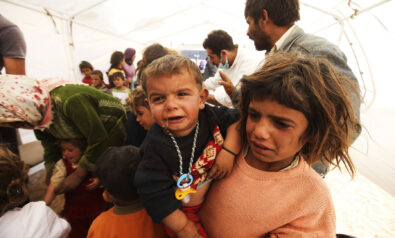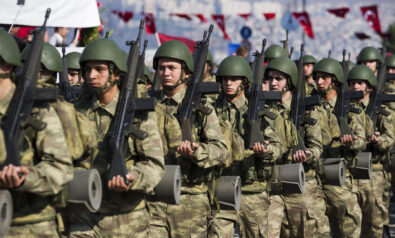On September 11, 2001, 19 militants associated with the Islamist terrorist group al-Qaeda hijacked four planes and launched suicide attacks on iconic symbols of America, first striking the twin towers of the World Trade Center in New York and then the Pentagon. It would be the deadliest act of terrorism on American soil, claiming nearly 3,000 lives.
Scroll down to read more in this 360° series
The attacks not only shocked the world, but the images of planes crashing into the World Trade Center came to define a generation. In a speech on October 11, 2001, then-President George W. Bush spoke of “an attack on the heart and soul of the civilized world” and declared “war against all those who seek to export terror, and a war against those governments that support or shelter them.” This was the start of the global war on terror.
The Story of the 9/11 Attacks and Retaliation
Osama bin Laden, the Saudi leader of al-Qaeda, inspired the 9/11 attacks. Khalid Sheikh Mohammed, a Pakistani Islamist terrorist and the nephew of the truck driver convicted for the 1993 World Trade Center bombing, masterminded the operation. The 9/11 Commission Report described al-Qaeda as “sophisticated, patient, disciplined and lethal.” It held that the enemy rallied “broad support in the Arab and Muslim world.” The report concluded that al-Qaeda’s hostility to the US and its values was limitless.
The report went on to say that the enemy aimed “to rid the world of religious and political pluralism, the plebiscite, and equal rights for women,” and observed that it made no distinction between military and civilian targets. The goal going forward was “to attack terrorists and prevent their ranks from swelling while at the same time protecting [the US] against future attacks.”
To prosecute the war on terror, the US built a worldwide coalition: 136 countries offered military assistance, and 46 multilateral organizations declared support. Washington began by launching a financial war on terror, freezing assets and disrupting fundraising pipelines. In the first 100 days, the Bush administration set aside $20 billion for homeland security.
On October 7, 2001, the US inaugurated the war on terror with Operation Enduring Freedom. An international coalition that included Australia, Canada, Denmark, Germany, Japan, the UK and other countries, with the help of the Northern Alliance comprising various mujahedeen militias, overthrew the Taliban, which was sheltering al-Qaeda fighters, and took over Afghanistan.
The war on terror that began in Afghanistan soon took on a global focus. In 2003, the Bush administration invaded Iraq despite the lack of a UN mandate. Washington made the argument that Iraqi dictator Saddam Hussein was developing weapons of mass destruction, represented a threat to world peace, and harbored and succored al-Qaeda and other Islamic jihadists. None of this proved to be true. Hussein’s regime fell as speedily as Mullah Omar’s Taliban.
Victory, however, was short-lived. Soon, insurgency returned. In Afghanistan, suicide attacks quintupled from 27 in 2005 to 139 in 2006. Globally, the war on terror saw a “stunning” rise in jihadist activity, with just over 32,000 fighters split among 13 Islamist groups in 2001 burgeoning to 100,000 across 44 outfits in 2015. Terrorist attacks went up from an estimated 1,880 in 2001 to 14,806 in 2015, claiming 38,422 lives that year alone — a 397% increase on 2001.
Boosted by the US invasion of Iraq, al-Qaeda spawned affiliates across Asia, Africa and the Middle East, a decentralized structure that remained intact even after the US assassination of Osama bin Laden in 2011 dealt al-Qaeda a severe blow. One of its Iraqi offshoots morphed into what became the Islamic State (IS) group following the withdrawal of most US from Iraq under President Barack Obama in 2011.
After declaring a caliphate in 2014, IS launched a global terrorist campaign that, within a year, conducted and inspired over 140 attacks in 29 countries beyond Syria and Iraq, according to one estimate. Islamic State acolytes went on to claim nearly 30,000 lives across the Middle East, Europe, the United States, Asia and Africa, controlling vast amounts of territory in Iraq and Syria, before suffering defeat by internationally-backed local forces in 2019.
In Afghanistan, despite the war’s estimated trillion-dollar price tag, on August 15 the Taliban have taken control of the capital Kabul amid a chaotic US withdrawal, raising fears of al-Qaeda’s comeback. Last year, the Global Terrorism Index concluded that deaths from terrorism were still double the number recorded in 2001, with Afghanistan claiming a disproportionately large share of over 40% in 2019.
Why Do 9/11 and the War on Terror Matter?
While the failures and successes of the war on terror will remain subject to heated debate for years to come, what remains uncontested is the fact that the 9/11 attacks and the ensuing war on terror have forged the world we live in today.
First, they have caused tremendous loss of blood and treasure. Brown University’s Costs of War project places an $8-trillion price tag on the US war on terror. It estimates that about 900,000 people “were killed as a direct result of war, whether by bombs, bullets or fire,” a number that does not include indirect deaths “caused by way of disease, displacement and loss of access to food or clean drinking water.”
Second, numerous countries, including liberal democracies such as the US and the UK, have eroded their own civil liberties and democratic institutions with the avowed goal of improving security. Boarding airplanes or entering public buildings now invariably involves elaborate security checks. Mass surveillance has become par for the course. The US continues to keep alleged terror suspects in indefinite detention without trial in Guantanamo Bay.
Third, many analysts argue that the attacks and the response have coarsened the US. After World War II, Americans drew a line in the sand against torture. They put Germans and Japanese on trial for war crimes that included waterboarding. In the post-9/11 world, torture became part of the American toolkit. Airstrikes and drone strikes have caused high collateral casualties, killing a disputed number of innocents and losing the battle for the hearts and minds of local populations.
These strikes raise significant issues of legality and the changing nature of warfare. There is a question as to the standing of “counterterrorism” operations in international and national law. However, such issues have garnered relatively little public attention.
Fourth, the 9/11 attacks and the ensuing war on terror have coincided with the spectacular rise of China. On December 11, 2001, the Middle Kingdom joined the World Trade Organization, which enabled the Chinese economy to grow at a speed and scale unprecedented in history. Analysts believe that distraction with the war on terror hindered the US response to the revolution occurring in global international relations and power dynamics.
Under Barack Obama, the US initiated an explicit pivot to Asia policy that sought to shift focus from the war on terror and manage the rise of China. Under Donald Trump, Washington unleashed a trade war on Beijing and concluded a peace deal with the Taliban. Joe Biden has believed that, since the early days of the war on terror, US priorities have been too skewed toward terrorism and that Afghanistan is a secondary strategic issue, leading to a decision to withdraw troops to mark the 20th anniversary of 9/11.
Biden has argued that the US has degraded al-Qaeda in Afghanistan and eliminated bin Laden. Despite worrying echoes of George W. Bush declaring the “mission accomplished” in Iraq in 2003, from now on, Biden wants the US to remain “narrowly focused on counterterrorism — not counterinsurgency or nation building.”
While the terrorist threat still consumes US resources, Washington is now shifting its strategic attention and resources to China, Russia and Iran. The Biden administration has deemed these three authoritarian powers to be the biggest challenge for the postwar liberal and democratic order. The 20-year war on terror seems to be over — at least for now.
The views expressed in this article are the author’s own and do not necessarily reflect Fair Observer’s editorial policy.
For more than 10 years, Fair Observer has been free, fair and independent. No billionaire owns us, no advertisers control us. We are a reader-supported nonprofit. Unlike many other publications, we keep our content free for readers regardless of where they live or whether they can afford to pay. We have no paywalls and no ads.
In the post-truth era of fake news, echo chambers and filter bubbles, we publish a plurality of perspectives from around the world. Anyone can publish with us, but everyone goes through a rigorous editorial process. So, you get fact-checked, well-reasoned content instead of noise.
We publish 2,500+ voices from 90+ countries. We also conduct education and training programs on subjects ranging from digital media and journalism to writing and critical thinking. This doesn’t come cheap. Servers, editors, trainers and web developers cost money.
Please consider supporting us on a regular basis as a recurring donor or a sustaining member.
Support Fair Observer
We rely on your support for our independence, diversity and quality.
Will you support FO’s journalism?
We rely on your support for our independence, diversity and quality.













